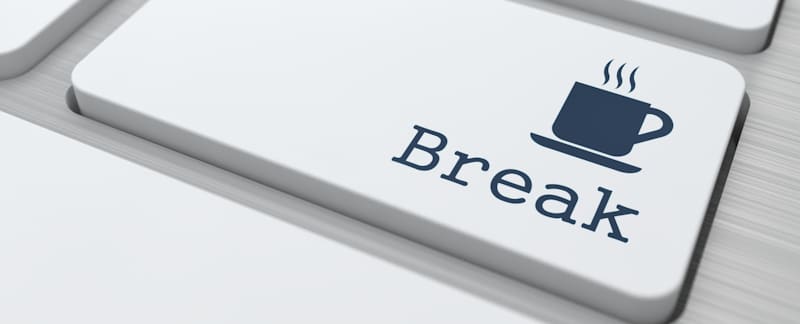Grammar errors are quite common in the English language. And there are some that are easier to comprehend and even accept. People mistaking “break” for “brake” or vice versa is not a rare occurrence at all.
The noun/verb “brake” means “to stop” and is usually used when talking about vehicles and something related. The term “break” has a meaning similar to “brake” but has nothing to do with automobiles. It is also a noun or a verb and can be used in various contexts or writing scenarios.
The word “brake” means more than just the mechanical device found in vehicles. And “break” assumes newer meanings in ways you may not be familiar with. Keep reading to learn everything about the two terms, how they get used in writings, and lots more.

“Brake” – An Introduction
The word “brake” means “to halt” or “bring something to a stop”. The term is both a noun and a verb. As a noun, it denotes the component that helps bring a vehicle (bike, car, etc.) to a stop by engaging with the vehicle’s wheels.
Unlike “break”, which has been around for several centuries and has appeared in pretty much all old Germanic languages, the word “brake” is relatively new – perhaps not more than two centuries old.
And that’s understandable since automobiles have not been around forever. Therefore, it’s only natural for the term to have been coined around the invention of some form of transport. It’s believed the term first appeared during the 18th century.
That said, “brake” is not just a word linked with planes, trains, and automobiles. It has also been used in relation to the tools used for breaking or crushing items, such as flax or hemp.
“Break” – An Overview
The term “break” could mean multiple things. Upon hearing the word, the very first meaning or definition that typically hits people’s minds is an object dividing or “breaking” into multiple pieces after being forcefully hit by or recklessly thrown against something.
The word “break” also denotes a thing that has stopped functioning or been rendered non-usable. The non-functioning item need not be physically broken or exhibit signs of external damage to be classified as “broken”. For example, if a printer displays an error message, it’s considered “broken” – not in the literal sense, but in relation to its inability to print.
The term could also mean “a relaxation period” or “a gap”, or “to violate” something. The phrases or expressions “break the law”, “break an agreement”, “break the rules”, etc. are examples. “Break” could also denote “to interrupt”, and at times “stop something permanently”.
“Breaking” Journalism
In the context of news and information, “break” means “to reveal” or “make something known”, as in “the scandal broke“, indicating the “scandal” is now public information. The “breaking news” expression perhaps needs no introduction.
“Broke” – As a Slang Term
In regular or standard English, the term “broke” is the past tense of “break”, as in “He broke his arm”. However, when used as slang, it means “impoverished”, “penniless”, “having no money”, etc. For example, in this sentence, “People in that business have been going broke forever”, “broke” means “losing money”.
Differentiating Between “Brake” and “Break”
“Brake” and “break” sound the same, which could create confusion. If you remember the spellings and meanings of the two words and understand the contexts in which the two are used, getting mixed up between them is highly unlikely.
The confusion between the two usually arises when their meanings are compared – to be specific, one of the various meanings of “break”. In other words, when the word “break” is used as a noun, it denotes “rest”. “Brake” also means to stop, but it’s primarily used to indicate how a vehicle stops or slows down.
This part of the comparison between the two is what gets tricky for most people. If you understand that “brake” and not “break” are linked with vehicles, you’ll never confuse the two.
Using “Brake” in Sentences
“Brake” can be used in sentences or phrases in different ways. The term “brake” is commonly used in the context of automobiles – for instance, “hit the car’s brakes“. The phrase “braking time” denotes the approximate time needed for a vehicle to stop after its brakes are applied completely.
When used as a noun, “brake” denotes a vehicle’s part.
- My car’s brakes are making some strange noises.
However, the word is more commonly used as a verb. For example:
- You are moving too fast! Please brake!
- We braked well before time and mitigated a possible accident.
The term could also be used figuratively – as in “to hit the brakes“. The expression can be used both literally and allegorically. For example:
- Hit the brakes right now if you don’t want to be booked for speeding. (literal)
- I think we are getting hurried by the process. Perhaps we must hit the brakes. (figurative)
Using “Break” in Texts
Since the term “break” could mean a few different things, the contexts or the sentences in which the word gets used vary quite a bit.
First, “break” can be used to denote objects separated into pieces or bits violently. For example:
- If she breaks the vase, she replaces the vase.
“Breaking a habit” means to stop doing a thing you were doing for long. For example, if you eat ice cream a lot and have been experiencing health issues as a result, you “break” the addiction to ice cream to become healthier again.
Since “break” can also mean a “gap” or “recess”, here is a sentence illustrating the same:
- Let’s take a break for 10 minutes before we assemble again.
In the above sentence, “break” denotes a brief or temporary pause. In the paragraph above the sentence, “break” means stopping something permanently. In other words, “break” could mean a “pause” or a “complete stop” based on the context and phrase it’s used in.
The word “break” can be used as “broke” (past tense) and “broken” (past participle). For example:
- She broke the glass on purpose.
- He fell and broke his arm.
- His arm was broken.
As mentioned earlier, “broke” is also slang. To ascertain when it’s used as slang and incorporated into a sentence as a past tense of the word, read the phrase or sentence it’s used in. The above sentences do not use “broke” as slang. The sentences below, however, do:
- Then she moved to Los Angeles, worked as a senior editor, went broke.
- If you do not responsibly handle your finances, you can go broke anytime.
Using “Break” in Expressions
Like “brake”, the term “break” can be used figuratively too. It has a lot more “figurative” applications than “break”. In other words, quite a few expressions and idioms use the word “break”. The following are some of them:
- To break even: Associated with money and business, it means to neither make a profit nor lose money. “The company was not hoping to register a profit, but they were expecting to break even at least.”
- To break ground: A phrase primarily used in the construction business, it means “to begin a thing”. “The business has broken ground for its fourth building this year.”
- To break (someone’s) heart: This popular expression means to ditch a romantic partner. “I liked her, but she was not fond of me, and that certainly broke my heart.”
- To break up: Similar to the expression above, “to break up” means ending a romantic relationship with someone. “We broke up last year, and both of us have been single ever since.”
- Breaking news: This common expression means a piece of recent information brought to the viewers’ or listeners’ attention almost right after it happened.
- Break the news: This expression is similar to the one above, but it primarily has a “bad news” or negative undertone. “I had to break the news to my neighbors about their dog’s recent accident.”
- To break free: The expression “to break free” means escaping from something. “After years of counseling, he managed to break free from his gambling addiction.” The term “break” can also be used in “prison break”, which means “prisoners escaping from prison”.
Example Sentences with the Word “Brake”
Here are a few sentences using the term “brake”, to give you more clarity on how the word gets incorporated in sentences:
- The driver stepped on the brakes to bring down the truck’s speed.
- She braked hard as soon as she saw a kid running toward the road.
- I think your car needs new brakes.
- Don’t you hear those squeaking brakes?
- I braked hard to avoid colliding with the oncoming cyclist.
- The brake cable can do some tightening up.
- She was repairing the car’s brake lever.
Example Sentences with the Word “Break”
The following are sentences incorporating the word “break”, “broke”, “broken”, etc.:
- She broke the record for the longest jump in the history of the competition.
- He broke his leg when he was just seven years old.
- I think this gaming console is broken.
- They are enjoying the break.
- I did not intend to break the new toy.
- My concentration was broken by your constant feet-tapping.
- We’ve been playing football for two hours straight with no break.
- I am broke and ruined.
Conclusion

The homonyms “brake” and “break” are incredibly similar in how they’re spelled and pronounced. And the trickiest part is if you happen to use the terms interchangeably, the resulting sentence may not read very odd or different at first glance.
Only once you take another look, you realize the wrong word was used. And this realization happens only if you are aware of the discrepancies existing between the two terms. Therefore, it’s imperative to learn what comes in between “brake” and “break”.
Shawn Manaher is the founder and CEO of The Content Authority. He’s one part content manager, one part writing ninja organizer, and two parts leader of top content creators. You don’t even want to know what he calls pancakes.


